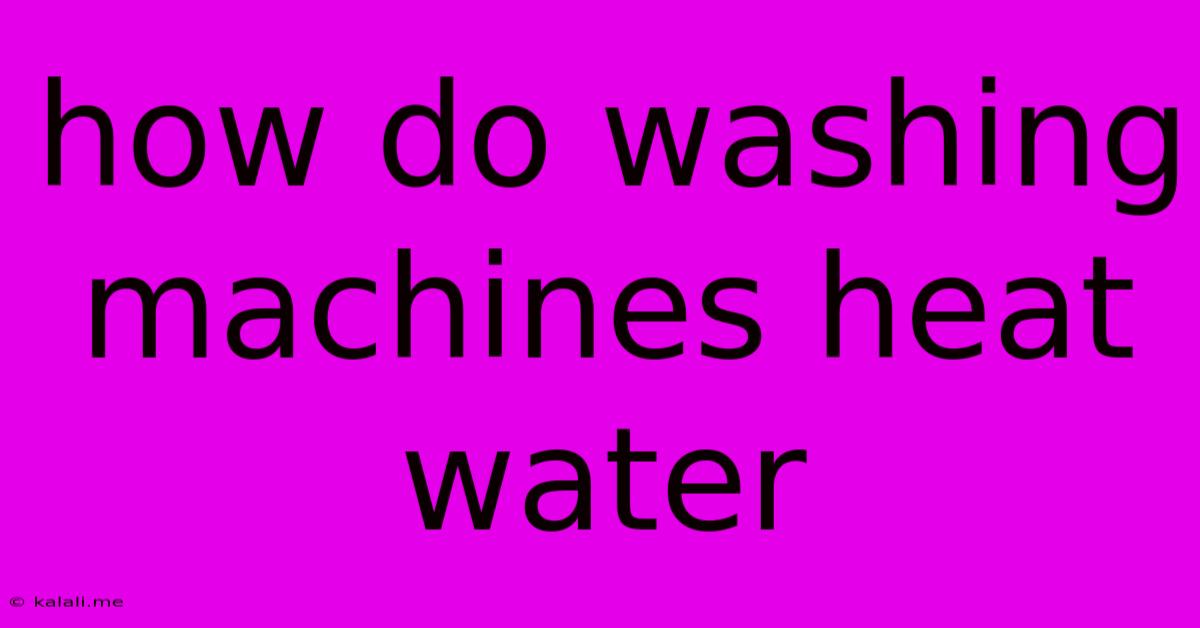How Do Washing Machines Heat Water
Kalali
May 21, 2025 · 3 min read

Table of Contents
How Do Washing Machines Heat Water? A Deep Dive into Heating Elements and Systems
Washing machines, those tireless laundry warriors, rely on efficient water heating to effectively clean our clothes. But have you ever wondered how they actually achieve this? This article will explore the different methods washing machines employ to heat water, delving into the mechanics and technologies involved. Understanding this process can help you troubleshoot issues, optimize your wash cycles, and appreciate the engineering behind your laundry routine.
Heating Elements: The Heart of the Heating System
The most common method used by washing machines to heat water is through a heating element, also known as an immersion heater. This simple yet effective component is typically a resistance heating element, similar to the one found in electric kettles. Here's how it works:
- Electrical Resistance: When the washing machine's heating cycle is activated, electricity flows through the heating element.
- Heat Generation: The resistance of the element converts this electrical energy into heat.
- Water Heating: The heating element is submerged in the water within the washing machine's drum, directly transferring heat to the water.
- Thermostat Control: A thermostat monitors the water temperature, switching the heating element on and off to maintain the desired temperature throughout the wash cycle.
This process is straightforward and highly reliable, making it a popular choice for many washing machine manufacturers. Different models might vary slightly in the precise design and placement of the heating element, but the fundamental principle remains the same. The heating element's size and power directly influence the speed at which the water reaches the target temperature.
Beyond the Heating Element: Variations and Considerations
While resistance heating elements are prevalent, other heating methods exist, albeit less commonly:
- Gas Heating: Some commercial or older washing machines might utilize gas heating. This involves a gas burner that heats the water indirectly, often via a heat exchanger to prevent direct contact between the gas flame and the water. Gas-heated washing machines require a gas connection and are generally less common in residential settings.
- Heat Pump Technology: A more energy-efficient approach gaining popularity is heat pump technology. This method uses a refrigerant cycle to extract heat from the surrounding air and transfer it to the water. This approach consumes significantly less energy compared to traditional resistance heating, contributing to lower running costs and a smaller carbon footprint. Heat pump washing machines are often more expensive upfront but offer long-term savings.
Troubleshooting and Maintenance
Understanding how your washing machine heats water can be crucial for troubleshooting issues. If your machine fails to heat the water adequately, the problem might lie within:
- Faulty Heating Element: A burnt-out or damaged heating element is a common culprit.
- Malfunctioning Thermostat: A faulty thermostat might prevent the heating element from activating correctly.
- Wiring Problems: Damaged or loose wiring can disrupt the power supply to the heating element.
- Thermostat Issues: A malfunctioning thermostat will fail to control the temperature correctly, leading to either insufficient heating or overheating.
Regular maintenance, such as cleaning the lint filter and ensuring proper ventilation, can also contribute to the longevity and efficiency of your washing machine's heating system.
In conclusion, while various methods exist for heating water in washing machines, the resistance heating element remains the most common and widely used. Understanding this fundamental principle and the various components involved allows for better troubleshooting and a greater appreciation for the technology behind this everyday appliance. By considering factors like energy efficiency and potential repair issues, you can make an informed choice when selecting a washing machine to meet your laundry needs.
Latest Posts
Latest Posts
-
Where Is Decking Height Measured From
May 21, 2025
-
Imessage Not Working For One Contact
May 21, 2025
-
How Long Do Fridges Take To Get Cold
May 21, 2025
-
Can U Get Ink Poisoning From A Pen
May 21, 2025
-
Can A Queen Move Like A Knight
May 21, 2025
Related Post
Thank you for visiting our website which covers about How Do Washing Machines Heat Water . We hope the information provided has been useful to you. Feel free to contact us if you have any questions or need further assistance. See you next time and don't miss to bookmark.